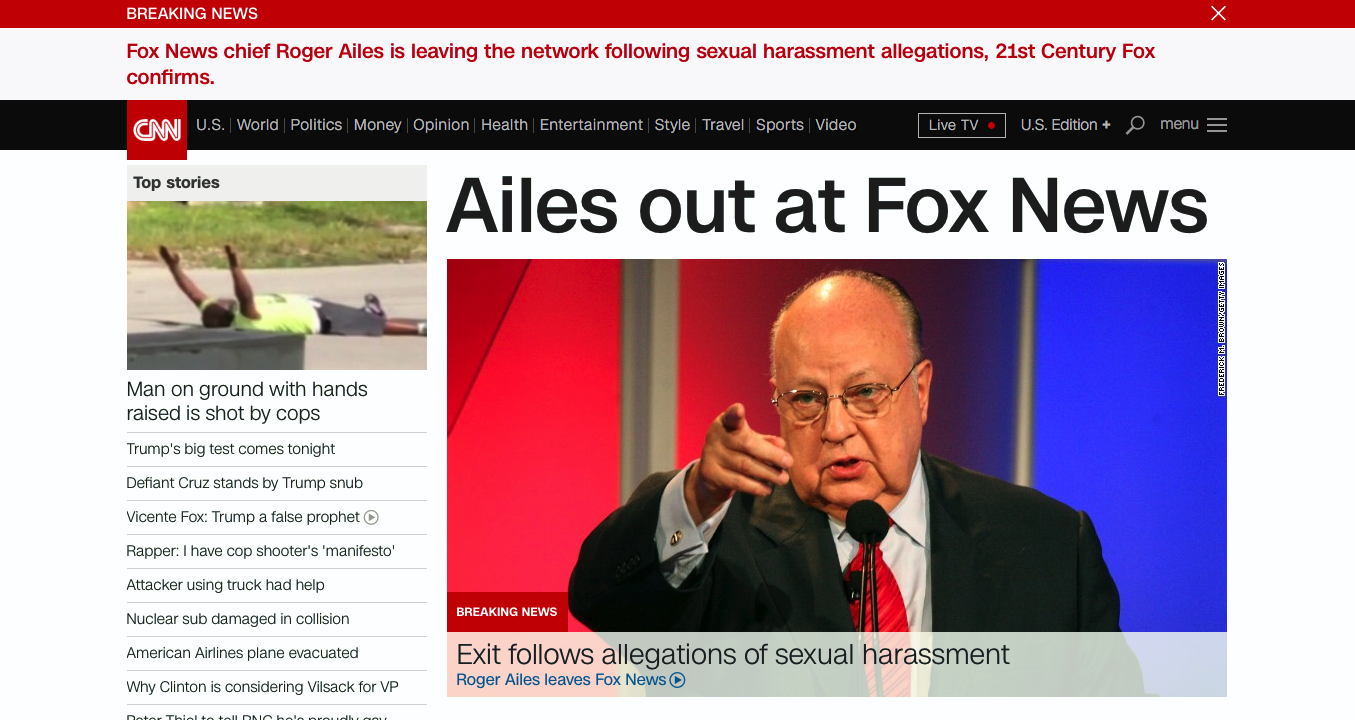Trump’s Outrageous Foreign Policy Views
by
Nancy LeTourneau
July 21, 2016 3:32 PM
Recently I’ve noticed that I have developed two lines of defense against the kind of panic I would feel about an actual Trump presidency. First and foremost is the fact that the odds against him being elected are enormous.
The Upshot recently calculated that Clinton has a 76% chance of winning.
Running a distance second to that defense is the fact that, as
Stephen Colbert put it, “If he doesn’t ever have to mean what he says, that means he can say anything.” As soon as Trump says something truly outrageous, he and his campaign get busy
walking it back. Just to demonstrate the level of outrageousness expressed by Trump, I actually fear his unpredictability less than I do what he says.
I must admit that the second line of defense tends to crumble with stories like the one
Kevin Drum reports with this headline: “Donald Trump Just Invited Russia to Attack Eastern Europe.” Or how about this one from
James Fallows? “It’s Official: Hillary Clinton Is Running Against Vladimir Putin.” Neither one of these men are the type who are prone to hyperbole. Here’s more from Fallows:
I am arguing that Trump’s understanding of America’s role in the world aligns with Russia’s geostrategic interests; that his critique of American democracy is in accord with the Kremlin’s critique of American democracy; and that he shares numerous ideological and dispositional proclivities with Putin—for one thing, an obsession with the sort of “strength” often associated with dictators. Trump is making it clear that, as president, he would allow Russia to advance its hegemonic interests across Europe and the Middle East. His election would immediately trigger a wave of global instability—much worse than anything we are seeing today—because America’s allies understand that Trump would likely dismantle the post-World War II U.S.-created international order. Many of these countries, feeling abandoned, would likely pursue nuclear weapons programs on their own, leading to a nightmare of proliferation.
That comes on the heels of what
Trump said during an interview with David Sanger and Maggie Haberman of
The New York Times. And no,
Paul Manafort, according to the actual transcript, Trump was not misquoted. He hedged on whether or not the United States should come to the defense of our NATO allies.
Anna Nemtsova reports from Russia that those statements are in line with what Donald Trump and his campaign staff have been saying and promoting all along.
Excited by Donald Trump’s pledge to promote “easing of tensions and improved relations with Russia,” the Kremlin establishment earlier this month invited Trump adviser Carter Page to speak before graduating students of the New Economic School. Page did not disappoint. In his remarks, Page condemned current American policy for its “often-hypocritical focus on democratization, inequality, corruption and regime change.” When a Russian student asked Page whether he really believed that American society was liberal and democratic, Trump’s advisr grinned and delivered a line that might have come from Vladimir Putin himself. “I surround the word ‘liberal’ with quotes,” he said. ”I tend to agree with you that it’s not always as liberal as it may seem,” he said. “I’m with you.”
It was thus perfectly in keeping with Trump campaign’s entente with the Kremlin that last week Trump aides reportedly watered down the new Republican platform on Russia, removing language that called for giving weapons to Ukraine to fight Russian and rebel forces. Page, an energy expert, has close ties to Russian business and relationships with executives at Gazprom, the giant state-run gas company. Trump campaign chairman Paul Manafort has worked as a lobbyist for former Ukraine’s former Russia-aligned president, Viktor Yanukovych.
For Putin, Trump is the gift that keeps on giving. Shunned and sanctioned by Western leaders for Russia’s aggression in Ukraine, Putin now sees a future ally riding into view. The Kremlin and its right-wing supporters also enthusiastically applaud the isolationist they see in Trump, who has suggested he might curtail U.S. involvement in NATO and European affairs, and who derides the same political “mainstream” that has deemed Putin a pariah.
As someone who has regularly critiqued how the U.S. handled the Cold War, I have no desire to return to that frame as a way to understand our relationship with Russia. But given the events in Georgia and Crimea over the last few years, we must also be cognizant of the threat Putin poses to our allies in Eastern Europe. As Fallows points out, our post-World War II international order has provided a kind of security that should never be easily dismissed.
What is also interesting to note are the business ties Nemtsova refers to between Trump’s advisor Carter Page and Russian oil interests. In a weird twist on the past, the Cold War with the USSR was used as a cover for U.S. corporations to promote their interests in South Asia, South America and the Middle East. To the extent that it is business interests that are driving this entente with the Kremlin, that makes it doubly dangerous.
As we watch all this unfold, remember that Republicans continue to claim that it is the foreign policy of Barack Obama and Hillary Clinton that has worried our allies and damaged our stature in the eyes of our enemies. But the exact opposite is true when we compare their record with what a Trump administration would do.
Now…with all that said, I’ll simply remind myself of my number one defense against panicking about a Trump presidency and hope my blood pressure goes back down.





 https://fivethirtyeight.com/features/the-end-of-a-republican-party/
https://fivethirtyeight.com/features/the-end-of-a-republican-party/






